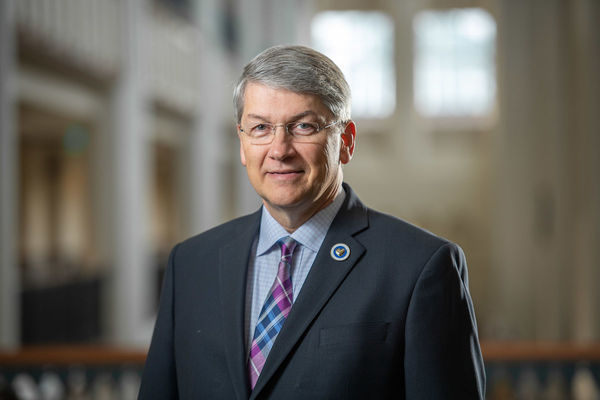Physician, heal thyself!
Dominic Vachon would reject association with Jesus’ proverb in the Nazareth synagogue. In so many words, however, that was his wife M.J.’s reaction when he came home from his counseling job and announced, “I hate my patients!” He was burnt out, a bitter irony since he had dedicated the previous decade to helping caregivers avoid burnout.
That was three decades ago. Today, Vachon ’80, ’85M.Div., is the John G. Sheedy, M.D., Director of Notre Dame’s Ruth M. Hillebrand Center for Compassionate Care in Medicine and the author of How Doctors Care: The Science of Compassion and Balanced Caring in Medicine. The position and the book were foreshadowed in M.J.’s actual response: “Your patients expect you to love them so you can help them.” Recovering that love for himself and helping other practitioners find it became his mission.
His younger brother Ovide’s three-year bout with cancer and death in 1983 also inspired him. The experience made him aware of the plight of patients and their families, as well as the spectrum of empathy from health-care providers — “people who were really wonderfully compassionate and people who were just checking the boxes waiting to go home.”
A few years later, while pursuing his Ph.D. at Loyola University, Vachon was one of the first researchers to poke holes in the prevailing belief in medicine that empathy leads to burnout. So he looked more deeply into the science of compassion.
Almost everyone has encountered a disengaged caregiver. “It’s not because people are not compassionate,” Vachon says. “They come to health care because they want to help people.” But when the pressures of the work, especially the suffering they encounter, become overwhelming, “cutting feelings off feels like the best answer.”

The pandemic has highlighted many fissures within the health-care system and complicating factors in relationships between providers and patients. Vachon says, “COVID is showing us our system is broken, and we’re taking health care professionals for granted. We don’t have enough people to do the work or enough resources.”
Adding insult to the injury of the stressed system, doctors and nurses must deal with COVID denial. “They feel betrayed by people they’re trying to serve,” Vachon says. Even in those cases, he notes, the provider needs to remain compassionate — because the science tells us compassion is essential to improving medical outcomes.
“Patients who feel cared for will provide better data to their physicians and receive better treatment,” Vachon says. For providers, compassion is “a buffer against burnout as well as a means for recovering from burnout.” Fortunately, he emphasizes, humans are hardwired to be compassionate, so “we can teach compassion.”
That is the ultimate purpose of Notre Dame’s Hillebrand Center, which was born from a dispiriting experience. One evening, psychologist Ruth M. Hillebrand received a call from a physician she had met only once. He told Hillebrand she had incurable cancer. Then he abruptly hung up.
In response, Hillebrand asked her brother Joseph ’43 to dedicate her estate to compassion training, and he helped establish centers in her name at Notre Dame and the University of Toledo Medical School. Vachon became the Center’s first director in 2011.
Notre Dame has no medical school. So why here? “The rationale was that Notre Dame was producing so many people who went into health care that it would be an experiment to see if teaching compassion at the pre-med level would work,” Vachon explains, although he views the program as essential to medical training, not just preparation for it. When students move into health care, he acknowledges, “We expect some will get burnt out, but we give them hope and tools to recover.”
The experiment seems to be succeeding. A survey of graduates who’d taken Center classes showed significant benefits. In another measure, students persuaded the University to begin offering a minor in compassionate care in 2019. Three students graduated with it that year, 18 in 2020, and 36 are scheduled in 2021. Another 70 are signed up.
A biochemistry major from Indiana, Leah Bode ’21 is minoring in compassionate care and will attend medical school next year. She says, “The Hillebrand Center is the reason I ultimately decided to come to Notre Dame.” She’s confident in her next steps, “thanks to my strong foundation in humanistic medicine.”
Vachon notes a special advantage Notre Dame offers. A spirituality or philosophy of caring offers providers a framework through which to respond to suffering. Many people don’t know how to talk about these beliefs, “but at Notre Dame we can talk about that explicitly,” he says, and when clinicians can do that, “it’s a powerful way to make them thrive.”
Quinn Retzloff ’22, a preprofessional studies major from Ohio who plans to attend medical school, chose the minor because “Dr. Vachon’s contagious enthusiasm for this cutting-edge shift from medicine’s paternalistic ‘biomedical’ model to a new ‘biopsychosociospiritual’ model of caring that could transform the patient as well as the physician was absolutely fascinating.”
Having healed himself, Vachon now shares with the next generation of caregivers the love his wife told him to find.
Patrick Gallagher lives in Aberdeen, South Dakota, where he works for a statewide foundation.